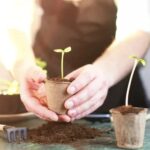When it comes to creating a beautiful and thriving garden in the Sunshine State, Florida gardening ideas are essential. From choosing the right plants to dealing with common pests and diseases, there are numerous factors to consider when cultivating a successful garden in Florida’s unique climate. Whether you’re a seasoned gardener or just starting out, these tips and ideas will help you create a stunning garden that thrives in the Florida environment.
Florida is known for its warm climate, abundant sunshine, and occasional extreme weather events. These conditions present both opportunities and challenges for gardeners. Understanding how to work with the natural environment is crucial for achieving gardening success in Florida. From choosing the best plants for Florida gardens to implementing sustainable practices, there are various aspects to consider when embarking on your gardening journey.
In this article, we will explore the best plants for Florida gardens, provide tips for successful gardening in the state, offer ideas for Florida-friendly landscaping, discuss how to deal with common pests and diseases, delve into seasonal gardening practices, and provide insight on creating a sustainable and unique garden design. Whether you have a green thumb or are looking to develop one, these Florida gardening ideas will help you cultivate a stunning and resilient garden in the Sunshine State.
Best Plants for Florida Gardens
Florida’s unique climate and soil conditions make it an ideal place for growing a wide variety of plants. Whether you’re looking to add some tropical flare to your garden or just want to find low-maintenance options that thrive in Florida, there are plenty of great plant choices to consider.
Tropical Plants
If you’re looking to add a touch of the tropics to your garden, Florida offers the perfect climate for growing plants like hibiscus, bougainvillea, plumeria, and various palm tree varieties. These plants not only bring vibrant colors and exotic beauty to your garden but also require minimal maintenance once established.
Native Plants
Native plants are well-adapted to Florida’s climate and can be extremely low-maintenance. Some popular native options include beautyberry, coontie, muhly grass, and firebush. Not only do these plants require less water and care than non-native species, but they also provide important habitat and food sources for local wildlife.
Edible Plants
For those interested in cultivating an edible garden, there are several fruits and vegetables that thrive in Florida’s warm weather. Consider planting citrus trees like oranges or grapefruits, as well as heat-tolerant veggies like tomatoes, peppers, and sweet potatoes. Herbs such as basil, rosemary, and mint also do exceptionally well in Florida gardens.
By selecting the right plants for your Florida garden based on the specific needs of your region, you can create a beautiful and thriving outdoor oasis that enhances your home’s curb appeal while embracing the natural beauty of the Sunshine State. Whether you prefer colorful tropical blooms or low-key native foliage, there are countless options available for successful gardening in Florida’s unique environment.
Tips for Successful Florida Gardening
Florida is a unique state when it comes to gardening, with its hot and humid climate presenting both opportunities and challenges for gardeners. Here are some tips to help you achieve success with your Florida gardening ideas:
1. Choose the right plants: When it comes to Florida gardening, it’s important to select plants that can handle the heat and humidity. Consider native plants like beach sunflower, coontie, firebush, and muhly grass. These plants are adapted to Florida’s climate and will require less maintenance.
2. Watering wisely: Proper watering is crucial for successful gardening in Florida. Since the state experiences heavy rainfall during certain times of the year, it’s important to adjust your watering schedule accordingly. In drier periods, consider installing a rain barrel or drip irrigation system to conserve water while keeping your plants hydrated.
3. Protect from pests and diseases: Florida’s warm and humid climate can attract a variety of pests and diseases that can wreak havoc on your garden. To protect your plants, consider using natural pest control methods like neem oil or introducing beneficial insects like ladybugs. Regularly inspect your plants for any signs of disease or infestation and take prompt action to prevent further damage.
By following these tips for successful Florida gardening in Florida gardens, you’ll be on your way to creating a beautiful and thriving garden that can withstand the unique challenges presented by the sunshine state. With careful plant selection, mindful watering practices, and proactive pest management, you can enjoy a flourishing garden year-round.
Florida-Friendly Landscaping Ideas
When it comes to landscaping in Florida, it’s important to choose plants and design elements that can thrive in the state’s unique climate and soil conditions. Here are some Florida-friendly landscaping ideas to create a beautiful and sustainable garden:
1. Native Plants: One of the best ways to ensure success in your Florida garden is to choose native plants. These species are well-adapted to the local environment, requiring less water, fertilizer, and maintenance. Some popular native plants for Florida gardens include firebush, coontie, beautyberry, muhly grass, and Simpson’s stopper.
2. Drought-Tolerant Plants: Given Florida’s hot and often dry climate, it’s essential to incorporate drought-tolerant plants into your landscape. Consider adding succulents like agave and yucca, as well as ornamental grasses such as fountain grass and Mexican petunia.
3. Water Conservation Features: In order to conserve water in your Florida garden, consider integrating water-saving features such as rain barrels, drip irrigation systems, and using mulch to retain moisture in the soil. Additionally, creating swales or rain gardens can help manage stormwater runoff while adding aesthetic value to your landscape.
By incorporating these Florida-friendly landscaping ideas into your garden design, you can create a beautiful outdoor space that not only enhances the natural beauty of the area but also supports the local ecosystem. With careful planning and attention to detail, you can enjoy a vibrant and sustainable garden that thrives in the Florida climate.
Dealing With Common Pests and Diseases in Florida Gardens
Florida gardens, like any other, are susceptible to various pests and diseases that can wreak havoc on your carefully tended plants. However, with the right knowledge and proactive measures, you can effectively deal with and prevent these common issues.
Identifying Common Pests
Some of the most common pests that plague Florida gardens include whiteflies, aphids, mealybugs, and spider mites. These tiny insects can quickly infest your plants, leading to stunted growth, yellowing leaves, and even plant death if left unchecked. Learning to identify these pests early on is crucial for effective pest control in your garden.
Natural Pest Control Methods
Florida gardening ideas often emphasize the use of natural pest control methods to avoid harmful chemicals that can damage the environment. Introducing beneficial insects like ladybugs and lacewings can help keep pest populations in check. Additionally, using neem oil or insecticidal soap can effectively control common garden pests without harming beneficial insects or other wildlife.
Preventing and Treating Plant Diseases
In addition to pests, Florida gardens are also susceptible to various plant diseases such as powdery mildew, downy mildew, and root rot. To prevent these diseases from taking hold in your garden, make sure to provide proper air circulation between plants and avoid overhead watering. If your plants do become infected, consider using organic fungicides or seeking advice from local gardening experts on effective treatment options.
By being proactive in identifying and addressing common pests and diseases in your Florida garden, you can ensure the health and success of your plants year-round. Incorporating these tips into your Florida gardening practices will help you maintain a vibrant and thriving garden that brings joy and beauty to your outdoor space.
Seasonal Gardening in Florida
Gardening in Florida can be a year-round activity due to its warm and sunny climate. However, it’s important to understand the seasonal changes and how they can affect your garden. Understanding the different seasons can help you plan and maintain a thriving garden throughout the year.
In the spring, Florida gardens come alive with vibrant colors and new growth. This is the perfect time for planting annuals, such as marigolds, petunias, and impatiens. It’s also a great time to start growing vegetables like tomatoes, peppers, and cucumbers. The spring season in Florida also brings more rainfall, so be sure to adjust your watering schedule accordingly.
Summer in Florida can bring intense heat and humidity, which can be challenging for some plants. Consider adding heat-tolerant varieties to your garden such as lantana, portulaca, and coleus. Mulching around plants can also help retain soil moisture and regulate temperature during the hot summer months.
In the fall, it’s time to prepare for the upcoming winter season by planting cool-season vegetables like lettuce, spinach, and kale. This is also a good time to add flowering perennials such as salvias, asters, and coreopsis to your garden for beautiful blooms through the cooler months. With milder temperatures and lower humidity, fall gardening in Florida can be especially enjoyable.
| Season | Recommended Plants |
|---|---|
| Spring | Marigolds, petunias, impatiens, tomatoes, peppers |
| Summer | Lantana, portulaca, coleus |
| Fall | Lettuce, spinach, kale, salvias, asters coreopsis |
Understanding these seasonal nuances will help you make informed decisions about what to grow at specific times of the year for successful florida gardening ideas. By planning ahead and taking advantage of each season’s unique characteristics and challenges, you can create a beautiful and thriving garden that flourishes year-round in Florida’s sunny climate.
How to Create a Sustainable Florida Garden
Creating a sustainable garden in Florida is not only beneficial for the environment, but it can also save you time and money in the long run. Sustainable gardening focuses on practices that minimize the use of non-renewable resources and reduce negative impacts on the ecosystem. Here are some tips for creating a sustainable Florida garden.
First, consider incorporating native plants into your garden. Native plants are well-adapted to the local climate, soil, and wildlife, making them low-maintenance and more resistant to pests and diseases. Examples of native plants in Florida include muhly grass, coontie, beautyberry, and firebush. By choosing native plants, you can reduce the need for pesticides and fertilizers, which is better for both your garden and the environment.
Another important aspect of sustainable gardening in Florida is water conservation. The Sunshine State is no stranger to droughts and water restrictions, so it’s crucial to design your garden with water efficiency in mind. Consider installing a rain barrel to collect rainwater for irrigation or choose drought-tolerant plants that require less frequent watering. Mulching your garden beds can also help retain moisture in the soil and suppress weed growth.
In addition to plant selection and water conservation, sustainable gardening in Florida can also involve composting organic waste from your kitchen and yard. Composting not only reduces greenhouse gas emissions from organic waste in landfills but also produces nutrient-rich compost that can be used as a natural fertilizer for your garden. By reducing reliance on synthetic fertilizers and pesticides, you can create a healthier ecosystem for your plants, pollinators, and other wildlife.
| Sustainable Gardening Tips | Examples |
|---|---|
| Incorporate native plants into your garden | Muhly grass, coontie, beautyberry, firebush |
| Conserve water through rainwater collection and drought-tolerant plants | Rain barrel installation; Xeriscaping with drought-tolerant plants |
| Compost organic waste for natural fertilizer | Kitchen scraps; Yard trimmings |
Unique Florida Garden Design Ideas
When it comes to creating a unique garden design in the state of Florida, there are plenty of opportunities to get creative and showcase the beauty of the region. One of the best ways to achieve a unique Florida garden design is to incorporate native plants into your landscape. By using native plants, you can create a garden that not only looks great but also supports the local ecosystem and wildlife.
In addition to using native plants, you can also add unique elements such as water features or rock gardens to your Florida garden. With Florida’s warm climate, adding a small pond or fountain can bring a sense of tranquility and natural beauty to your outdoor space. Likewise, incorporating rocks and boulders into your garden design can add texture and visual interest while also serving as habitats for small animals and insects.
Another way to achieve a unique Florida garden design is by incorporating sustainable gardening practices. This could include installing rain barrels or utilizing drought-tolerant plants to conserve water, as well as creating a habitat for beneficial insects like bees and butterflies. By focusing on sustainability, you can not only create a beautiful garden but also contribute to the preservation of Florida’s natural environment.
By implementing these unique Florida gardening ideas into your landscape design, you can create a one-of-a-kind outdoor space that reflects the beauty and diversity of the Sunshine State while also supporting its delicate ecosystem. Whether you choose to incorporate native plants, water features, or sustainable gardening practices, there are countless ways to make your Florida garden design stand out and thrive in this unique environment.
Conclusion
In conclusion, Florida gardening offers a unique set of challenges and opportunities for gardeners. With the right plants, tips, and ideas, anyone can create a beautiful and successful garden in the Sunshine State. By selecting the best plants for Florida gardens, implementing Florida-friendly landscaping ideas, and staying proactive in dealing with common pests and diseases, gardeners can find great success in their endeavors.
Creating a sustainable Florida garden is not only good for the environment but also adds to the overall appeal of your outdoor space. By embracing eco-friendly practices such as composting, water conservation, and native plantings, you can contribute to a healthier ecosystem while enjoying a vibrant and thriving garden.
With an abundance of seasonal gardening opportunities throughout the year in Florida, there are always new ways to keep your garden looking its best. Whether it’s tropical plants in the summer or cool-season vegetables in the winter, there’s always something new to try.
By incorporating unique design ideas that embrace the beauty of Florida’s natural landscape and climate, you can truly make your garden stand out. Overall, with dedication and creativity, anyone can achieve success in their Florida gardening endeavors.
Frequently Asked Questions
What Is the Best Low Maintenance Landscape in Florida?
The best low maintenance landscape in Florida often includes native plants that are well adapted to the climate and soil conditions. Using mulch and drip irrigation can also help conserve water and reduce maintenance needs.
How to Design a Garden in Florida?
When designing a garden in Florida, it’s important to consider the state’s hot and humid climate. Choosing heat-tolerant plants, creating adequate drainage, and incorporating shade structures can all contribute to a successful garden design in Florida.
How Do I Landscape My Yard in Florida?
Landscaping a yard in Florida requires careful planning due to the state’s unique environmental factors. Incorporating drought-resistant plants, utilizing efficient watering systems, and considering hurricane-resistant features are all important considerations when landscaping a yard in Florida.

Welcome to my gardening blog! I am passionate about plants and enjoy sharing my knowledge and experiences with others. In this blog, I will write about everything related to gardening, from tips on how to get started to updates on my own garden projects.





